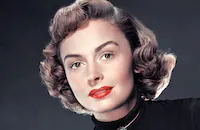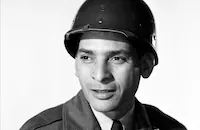They Rode West

Brief Synopsis
Cast & Crew
Phil Karlson
Robert Francis
Donna Reed
May Wynn
Phil Carey
Onslow Stevens
Film Details
Technical Specs

Synopsis
In removing a Comanche arrow from an officer's leg, Fort McCullough's drunken Dr. Gibson severs his patient's femoral artery. Capt. Peter Blake watches the young man die and then attacks the doctor, calling him a "murdering butcher." Later, Col. Ethan Walters, commander of the post, complains in a letter to the U.S. Surgeon General that the last three medical officers assigned to the fort have been alcoholic incompetents. Some time later, a train arrives from the East, carrying the colonel's wife, Martha Walters, her pretty and flirtatious niece, Laurie MacKaye, and the fort's new surgeon, Dr. Allen Seward. Distrustful of all physicians, Blake is unrelentingly hostile toward Seward, who is not only very young, but completely inexperienced at handling horses and firearms. During the two-day ride back to the fort, Seward asks Sgt. Creever, an Irish immigrant with a fondness for "rare old Irish whiskey," if the local Kiowa Indians are "tame." Creever explains that although the Kiowa now live on a reservation, they successfully resisted the Cavalry's attempts to get them there for many years. That evening, Creever is knocked unconscious by some Indians, who quietly enter the camp to steal rifles and cartridges. Seward catches a glimpse of them and then attends to Creever. Back at the fort, some of the men show their appreciation for the skill and determination with which Seward treats his patient and cleans up the filthy fort hospital. Blake is unconvinced, however, and at the Kiowa reservation, treats the Indians roughly. He demands that Seward identify the gun thieves, but the doctor does not comply because he is too preoccupied with a young malaria patient, the son of Manyi-ten, a white woman married to Chief Satanta's son Red Leaf. Seward addresses Isatai, the medicine man, with respect, thereby earning the trust of the Kiowa healer. Later, Seward learns that the illness has spread. Disregarding orders, Seward again visits the reservation, where Isatai, himself sick, takes the doctor's quinine in order to convince the others of its efficacy. Manyi-ten, who reveals that she was reared by the Kiowa after her white parents drowned, tells Seward that the reservation's water supply is bad, but that up in the hills, the water is clean. Seward advises the tribe to go there, but Blake arrives and orders him back to the fort at gunpoint. At that moment, Red Leaf, who refused to take Seward's medicine, dies. As they are returning to the fort, Blake and Seward are attacked by the gun thieves, who turn out to be Comanches. A Cavalry unit arrives in time to save the two men, but the Comanches get away. The colonel again orders Seward to avoid the reservation, but the doctor refuses to comply, protesting that the Kiowa are ill only because they must live on a poorly situated reservation. Seward is arrested but ordered to join Blake in locating the Comanches. While searching the area, they discover that the Kiowa have left the reservation. Blake's men spot the Comanches, but the Kiowa, heading toward the hills, see that Blake is about to ambush them. In the fierce battle that follows, the Kiowa lend the Comanches their assistance, and many soldiers are killed. The injured troopers, who blame Seward for the Kiowa revolt, refuse his treatments, calling him by the nickname Blake has pinned on him, "Woodhawk," a bird that turns against its own kind. Manyi-ten warns Seward that the Kiowa, now formally allied with the Comanches, are planning a major attack, and shortly afterward, a patrol races into the fort just ahead of a crowd of charging warriors. The soldiers try to defend the fort, but one of the soldiers is ill, and soon half of the men are stricken with malaria. They blame Seward for this, too, but Laurie defends and encourages him. Seward steals away to the Indian camp to persuade the Kiowa to make peace, but Blake, assuming the doctor is a traitor, hides behind a tree and fires at him. By mistake, the captain hits Spotted Wolf, Satanta's only surviving son and Manyi-ten's new husband. Seward returns to the fort with an ultimatum from the Indians: Either let Seward use the hospital to operate on Spotted Wolf or face immediate attack by the allied Kiowa and Comanche tribes. Col. Walters admits the doctor, his patient, and the two Indian chiefs, and then waits worriedly while Seward operates. Finally, the chiefs emerge from the hospital, and Satanta praises Seward not only for having saved his son, but for treating the Indians as brothers. Col. Waters promises to help move the Kiowa to the high country, and the men shake hands. Seward takes Laurie's arm, and the couple returns to the hospital.

Director

Phil Karlson
Cast

Robert Francis

Donna Reed
May Wynn

Phil Carey

Onslow Stevens
Peggy Converse

Roy Roberts

Jack Kelly
Stuart Randall
Eugene Iglesias

Frank Dekova
John War Eagle
Ralph Dumke
Julia Montoya

James Best
George Keymas

Maurice Jara
Edmund Cobb
Ben Corbett
Carl Andre
Morgan Jones
Glen Thompson
J. P. "bill" Catching
Don Harvey
John Damler
Myron Healey
Fred Letuli
William P. Wilkerson
Frosty Royce
Harry Lauter
James Anderson
Crew
Henry Batista
F. Buckley
Francis Cugat
Leo Katcher
Charles Lawton Jr.
Sam Nelson
Frank Nugent
Cary Odell
Lewis J. Rachmil
Paul Sawtell
Devallon Scott
Frank [a.] Tuttle
Josh Westmoreland

Film Details
Technical Specs

Articles
They Rode West
They Rode West (1954) is one of three B Westerns which Donna Reed made at Columbia after her exceptional performance in From Here to Eternity (1953), which later earned her an Academy Award for Best Supporting Actress. Reed hoped that her performance in that film would lead to more ambitious roles, and she balked when the studio head Harry Cohn offered her a part in a B-quickie instead. In retaliation for her refusal, Cohn assigned her to the Westerns. Actually, the three films are not without merit; besides They Rode West, they include the underrated Gun Fury (1953) and Three Hours to Kill (1954). After getting loaned out to MGM for The Last Time I Saw Paris (1954), Reed managed to get released from her contract at Columbia and made her next few films at Paramount and Universal.
They Rode West is also noteworthy as one of several Westerns during the 1950s which attempted to offer a more complex representation of Native Americans. Such films in fact date back to the silent era, but Delmer Daves' Broken Arrow (1950) in particular revitalized that effort. While They Rode West still constructs an opposition between the warlike Comanche and the peaceful Kiowa, the main thrust of Leo Katcher's story and Frank S. Nugent's and DeVallon Scott's screenplay is to juxtapose Dr. Seward's compassion and emphasis on mutual dialogue with Blake's mistrust and over-reliance on combat. Working titles for the film were The White Feather and The Wood Hawk, the latter referring to the nickname that Seward earns for supposedly "betraying his own kind."
The film received little critical attention during its initial release, but Variety called the film "a cut above [the] standards of most such offerings" and praised the film's "handsome color lensing." The reviewer also singled out the performances of Donna Reed, May Wynn and the young Robert Francis (1930-1955). This was the first starring role for Francis, and only his second major role after The Caine Mutiny (1954). He appeared in just two more films - The Long Gray Line (1955) and The Bamboo Prison (1954) - before his untimely death in a private plane accident.
Director: Phil Karlson
Producer: Lewis J. Rachmil
Screenplay: DeVallon Scott and Frank S. Nugent, based on a story by Leo Katcher
Director of Photography: Charles Lawton, Jr.
Art Director: Cary Odell
Music score: Paul Sawtell
Film Editor: Henry Batista
Cast: Robert Francis (Dr. Allen Seward); Donna Reed (Laurie MacKaye); May Wynn (Manyi-ten); Phil Carey (Capt. Peter Blake); Onslow Stevens (Col. Ethan Waters); Peggy Converse (Martha Walters); Roy Roberts (Sgt. Creever); Jack Kelly (Lt. Raymond); Stuart Randall (Chief Santanta); Frank DeKova (Isatai); John War Eagle (Chief Quanah).
C-85m.
by James Steffen
SOURCES:
Review of They Rode West. Variety. October 27, 1954. Fultz, Jay. In Search of Donna Reed. Iowa City: Iowa University Press, 1998. Royce, Brenda Scott. Donna Reed: A Bio-Bibliography. New York: Greenwood Press, 1990.

They Rode West
Quotes
Trivia
Notes
The working titles of this film were The Wood Hawk and White Feather. "The Wood Hawk," which was sometimes spelled as "Woodhawk," was also the title for Leo Katcher's original screen story. According to a June 1954 Daily Variety news item, Columbia changed the title from White Feather to They Rode West after the MPAA gave title priority to Panoramic Productions, which released a picture called White Feather in 1955.
A November 4, 1952 Daily Variety news item announced that Columbia was seeking James Stewart for the leading role and that Vincent Sherman was slated to produce this film. Robert Francis and May Wynn had previously appeared together in the 1954 Columbia picture The Caine Mutiny, and according to modern sources, were a "fan magazine item" at the time. The film's copyright record, which was deposited in September 1954, lists a running time of 90 minutes, suggesting that before its October 1954 trade showings, the picture was cut by six minutes.














